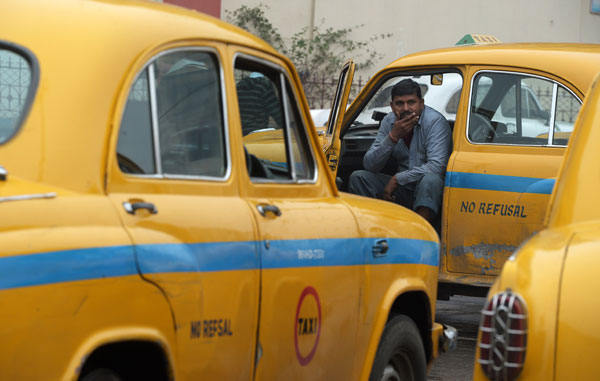NEW DELHI — From London and Paris to New Delhi and Sao Paulo, traditional taxi drivers united worldwide against Uber in 2015, a year that saw riots, legal battles and even a kidnapping in protest against the startup.
Since first winning customers in San Francisco five years ago, Uber has enjoyed spectacular global growth by allowing customers to hail drivers using a smartphone app and bypass traditional taxi services.
But the company, now operating in 58 countries and valued at more than $50 billion, has suffered a bumpy ride on the road to success, infuriating conventional cab firms and battling regulators across numerous nations.
The firm's safety standards have also been called into question after Uber drivers were accused of abduction and sexual attacks of female passengers in India and the United States.
In New Delhi authorities attempted to ban the firm, after it was accused of failing to conduct adequate background checks on a driver who last month was jailed for life for the rape of female passenger in his car. But Uber has flouted the ban much to the outrage of traditional car services.
In many countries, cabbies say Uber represents unfair competition because its drivers are not subject to the often-strict rules and restrictions that govern conventional firms.
Their anger boiled over in 2015, notably in Paris where rioting by heavily unionised taxi drivers and the arrest of Uber executives in June led the startup to suspend its low-cost UberPOP service — six months after it was banned.
Licensed cabbies, who in some countries must undergo hundreds of hours of training, accuse Uber of endangering their jobs by flooding the market with cheaper drivers who only need a GPS to get around.
'Pushed to the brink'
"Taxi drivers, alright — they've got big mouths — but normally they're not aggressive," said Malia, who has driven a taxi in Paris for three years said of the riots in the city, which included torching of cars.
"But these guys have families to feed, debts. They've been pushed to the brink."
Uber does not employ drivers or own vehicles, but instead uses non-professionally licensed contractors with their own cars, allowing them to run their own businesses.
In London, 1,500 of the city's iconic black cabs blocked streets in September, while Mayor Boris Johnson raised drivers' ire after calling those opposed to new technology "Luddites".
Black cabbies spend three years studying for "The Knowledge", a gruelling test that requires them to memorise every street in London before gaining a licence, a tradition dating back to the 1800s.
They say they are being squeezed by the popular, cheaper Uber.
In New Delhi, the ban authorities set out in the aftermath of the rape case has not been strictly enforced and Uber has continued to operate in the city.
Traditional taxi drivers lounge on their black and yellow Ambassador taxis, a familiar sight in the Indian capital for generations, waiting for fares.
"I don't get customers for days. We sit idle for hours waiting for customers who book Uber even before they step out of their homes," Sharad Kumar, a driver for 27 years, said at a stand.
"Uber and other taxis are getting money from foreign companies and are providing services at much cheaper rates. We cannot compete with them," he said.
The 53-year-old, who earns 15,000 rupees ($224) a month, acknowledged that old-style cabbies needed to embrace new technology to compete, but said they lacked funds to do so.
Simran Singh, 25, represents the new breed of taxi driver. He quit his job as a sales executive two months ago to become an Uber driver, using his own car, and now earns a daily wage of around $30 through fares and incentive payments, compared to around $22-a-day previously.
"It's only been a few days but the earnings are promising," Singh said.
Legal fightback
Uber pays sums on top of fares to woo drivers, part of aggressive expansion plans that this year saw it reach 22 cities in India alone, its largest market by cities outside the United States.
Uber chief adviser David Plouffe has defended the firm, saying debate had been heavily focused on the startup's effect on traditional cabbies.
"There has been much less focus on Uber's broader impact on the economy, especially the scale of that impact," he said in Washington, DC in November, with its 1.1 million drivers worldwide earning more than $3.5 billion this year.
Uber has vowed to fight back against a mountain of legal challenges, especially in Europe, after quickly expanding often in brazen violation of local laws.
In October police raided the company's European headquarters in the Netherlands while in London, officials proposed a 27-page set of regulations that Uber said made "no sense".
In Germany, a court in March ordered the company outright to stop its service.
Fighting back, Uber has turned to the European Union to help undo the bans and filed complaints in Germany, France and Spain.
But worldwide, traditional taxis remain fiercely opposed to Uber, with violent protests as far afield as Brazil, including a brief kidnapping of an Uber driver in Sao Paulo.
In the capital of neighbouring Uruguay, hundreds of cabbies blocked a central street in November to prevent Uber from training new drivers.
"They came here to take away all the jobs in the formal sector," taxi union president Oscar Dourado said.
